Presidency of Mauricio Macri
| Presidency of Mauricio Macri | |
|---|---|
.jpg) | |
| In office | |
| Since 10 December 2015 – (Incumbent) | |
| Preceded by | C. Kirchner presidency |
| Seat |
Casa Rosada, Olivos, Greater Buenos Aires |
| Political party |
Republican Proposal (PRO), Cambiemos |
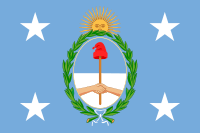 | |
The Presidency of Mauricio Macri began on 10 December 2015, when Mauricio Macri was sworn into office on 10 December 2015 to a four-year term as President of Argentina. Macri took office following a 51.34% to 48.66% runoff ballotage win over Daniel Scioli in the 2015 general election. He is Argentina's first democratically-elected non-Radical or Peronist president since 1916.
President-elect
He has promised to reduce inflation, improve conditions for business, and cease the international alignment with Venezuela and Iran.[1] Macri has announced an infrastructure development strategy named Plan Belgrano (after Manuel Belgrano), a plan aimed at building infrastructure and encouraging industry development in ten of Argentina's northern provinces, which have historically lagged behind the rest of the country in these areas. The plan includes a proposed investment of equivalent to 16 billion United States dollars over the course of 10 years, along with an "historical reconstruction fund" of 50 billion pesos to be used in 4 years. Other objectives of the plan include the provision of housing for some 250,000 families, and the construction of 1400 child care centers.[2][3][4]
Macri announced the full composition of his cabinet on November 25, 2015, some two weeks before he was due to take office.[5][6]
Inauguration
Macri took office on 10 December 2015. He began the ceremony starting from his apartment in the neighborhood of Recoleta at the corner of Avenida del Libertador and Cavia at 11:00pm to the National Congress of Argentina with his wife Juliana Awada and his youngest daughter of 4 years old, through the Casa Rosada and the Plaza de Mayo. At 11:41 he entered the room where the Legislature was, taking an oath after the Vice President Gabriela Michetti. Then he delivered a speech of 27 minutes in which he pledged his "support for an independent judiciary, fight corruption and drug trafficking, the internal union of Argentina, universal social protection, create a XXI-century style of education and that everyone can have a roof, water and sewer". Also greeted his competitors during the presidential elections.[7]
Later he went to the Casa Rosada, where he received the presidential attributes in the White Hall of the hands of the Temporary President of the Senate, Federico Pinedo, accompanied by Vice President Gabriela Michetti, president of the Chamber of Deputies Emilio Monzó and President of the Supreme Court Ricardo Lorenzetti. Minutes later came the historic balcony where thousands of people waited in the Plaza de Mayo, expressing his hope that "the Argentines can live better, starting a wonderful time for our country, always telling the truth, being honest, showing the problems " and calling " the Argentines to accompany management and alerting when he mistake".[8]
After being anointed President, he gave a reception at the San Martín Palace of Argentina Foreign Ministry to all the heads of state present: Michelle Bachelet from Chile, Horacio Cartes from Paraguay, Juan Manuel Santos from Colombia, Rafael Correa from Ecuador, Evo Morales from Bolivia, Dilma Rousseff from Brazil, and representatives of other countries attending his inauguration.[9]
Foreign relations
During his government, Macri wants to strengthen ties with Brazil and the Southern Cone, looking away from the Bolivarian axis and claim for political prisoners in Venezuela. It will also promote the repeal of the agreement with Iran and work for a rapprochement with the United States and Europe.[10] He has also worked to strengthen relations with Israel.[11][12]
Latin America
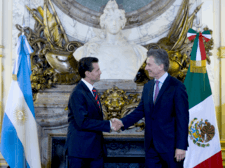
After being elected President, Macri received many congratulations from other Latin American Presidents. Despite the ruling Workers' party having supported Daniel Scioli during the campaign, Brazilian President Dilma Rousseff congratulated Macri and invited him to a state visit "as soon as possible", while she was also set to attend Macri's inauguration as president. The pair have favored improving bilateral relations between the two countries, as well as strengthening the Mercosur trade bloc.[14] The Chilean President, Michelle Bachelet, contacted Macri by phone and spoke about the importance for both countries of maintaining the spirit of cooperation, integration and development which characterizes their common history and the importance of further work for Latin America.[15] Juan Manuel Santos expressed "Congratulations to Mauricio Macri for his victory in presidential elections in Argentina. Successes in his management. It has our full support".[16] The President of Ecuador, Rafael Correa, congratulated Macri for his victory and wished him "the best of luck".[17] The President of Mexico, Enrique Peña Nieto, stated that "Mexico will work with" Macri's government to strengthen "bilateral relations and the wellbeing of Latin America".[18] Peruvian President Ollanta Humala contacted Macri in order to congratulate him on his election victory and point out that the Peruvian Government has "strong will" to strengthen ties with his country, reported the Peruvian Foreign Ministry.[19] Uruguayan president Tabaré Vázquez greeted Macri by telephone and asked him to convey his congratulations to the people of Argentina for the civic maturity demonstrated during the election.[20]

Immediately after the elections, Macri announced that he would ask for the invocation of Mercosur's "democratic clause" (limiting membership to democracies) with regard to Venezuela, since the government of Nicolás Maduro was not respecting democratic doctrines. He called for the holding of the 2015 Venezuelan elections without electoral fraud or tricks to avoid the result, and the release of political prisoners. In the end Maduro acknowledged the defeat of his party in the elections.[22] Nevertheless, Macri made diplomatic requests for the political prisoners in the first meeting of Mercosur that he attended.[23] Venezuela's opposition hailed Macri's presidential win in Argentina as a blow for leftists in Latin America and a good omen for their own duel with Chavismo in the next month's parliamentary vote. "That was a big disappointment for Venezuela's ruling socialist 'Chavismo' movement, which had a close political alliance with Fernández."[24] Diosdado Cabello called Macri a "fascist", and asked him to stay away from Venezuelan internal affairs, as Macri had proposed to remove Venezuela from the Mercosur because of the treatment to Leopoldo López and other political prisoners.[25] The victory of Macri is considered part of the decline of the Pink Tide in the region.[26]
On November 5, Macri made his first trip as President-elect to Brazil, where he met with President Dilma Rousseff in Brasilia. Macri said he chose Brazil for his first trip as President-elect because it is the main commercial partner of Argentina and because of the strong ties that both countries have.[27] That same day, Mauricio Macri traveled to Santiago de Chile, where he was received by President Michelle Bachelet in the Palacio de la Moneda.[28]
United States
.jpg)
The United States Secretary of State John Kerry congratulated the country for its "successful elections", adding that he was "looking forward to working closely" with Macri and his government.[29] Meanwhile, United States Ambassador to Argentina Noah Mamet wished Macri well.[18] Members of the United States House of Representatives later asked Barack Obama in a letter to prioritise US-Argentine relations during 2016, stating that "The United States and Argentina should be natural partners. Both have highly educated populations, diversified economies and vast natural resources" and calling such a relationship a "win-win" for both countries. The letter also stressed the importance of reversing high levels of anti-Americanism in the country and resolving the holdout problem with the vulture funds, among other key issues.[30] Obama later congratulated Macri personally, while an official White House statement confirmed that the President intends to strengthen ties.[31] The relations between Argentina and the United States began to twitch due to the problem that came into the Argentine Government and the vulture fund, where former President Cristina Fernández de Kirchner stated after the latter denial of certiorari that her country had an obligation to pay its creditors, but not to become the victims of extortion by speculators; even if Argentina can't use the U.S. financial system to do so, she said, teams of experts are working on ways to avoid such a default and keep Argentina's promises.[32] The expiration of Rights Upon Future Offers (RUFO) in December 2014 will preclude other bondholders from suing for better terms should the Argentine Government and the vulture funds settle, making such a settlement all the more likely after that date, should the dispute continue.
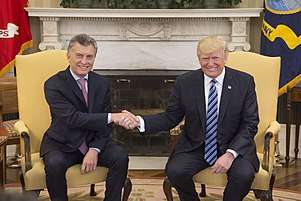
On February 18, 2016, a White House official announced that President Obama would undertake a state visit to Argentina on March 23–24, 2016 to improve the Argentina–United States relations after the two countries' relations under predecessors Cristina Fernández de Kirchner and Néstor Kirchner saw tension in trade and investment.[33][34] President Obama and the First Family arrived in Buenos Aires Ministro Pistarini International Airport from Havana, Cuba at around 1 a.m. (UTC−3) on Wednesday, March 23, where they were greeted by Argentine Foreign Minister Susana Malcorra.[35][36] Obama and Macri discussed ways to strengthen cooperation in promoting "universal values and interests," such as in the areas of security, energy, health and human rights, where the two presidents have agreed for U.S. federal agencies to assist Argentina's counter-terrorism efforts, to contribute to peacekeeping missions, combat illegal drug trade and organized crime, respond to diseases and outbreaks like the Zika virus, and develop resources and renewable energy strategies.[37] Obama also praised Macri for his economic reforms that helped create "sustainable and inclusive economic growth" and "reconnected Argentina with the world economy."[38] Thus, Obama declared a "fresh era" of relations that would help Argentina's credibility in the Latin American region and the world, and announced trade and economic initiatives to reset the countries relations after years of tension.[39][40]
On 24 March 2016, Foreign Minister Susana Malcorra announced that Argentina signed agreements with the United States to join again on the Visa Waiver Program. Argentina initially joined on the program in 1996, but was removed in 2002.[41][42][43]
Europe
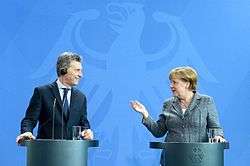
Many European leaders publicly expressed support for the new government of Macri. German Chancellor Angela Merkel congratulated Macri and requested that he make a state visit to Germany. She added that the two countries have "always been deeply tied", particularly in the area of science, which she deemed "one of the pillars" of the two countries' relations. Merkel also remarked that she would be "thankful" if the countries could strengthen cooperation "in all areas".[44] Spanish Prime Minister Mariano Rajoy, who has a close relationship with Macri, congratulated him and invited him to carry out a state visit "as soon as possible", stating that he is confident that the new government will "lead this new stage with success" while offering "the necessary support to consolidate the historical ties of friendship, fraternity and cooperation". The relationship between Spain and Argentina had become increasingly tense under the presidency of Cristina Kirchner, particularly after the Renationalization of YPF in 2012.[45] In a telegram to Macri, Russian President Vladimir Putin expressed his hopes that the two countries will continue to increase the "bilateral cooperation within diverse areas and the coordination of efforts to resolve current occurrences within the international agenda", adding that "the fundamental interests of the people of Russia and Argentina contribute to guarantee the stability and security of Latin America and the world", while reminding Macri that the countries had recently celebrated 130 years of diplomatic relations. Putin also made reference to the ongoing nuclear power and hydrocarbon extraction projects between the countries.[46] In February 2016, Macri received the President of Bulgaria, Rosen Plevneliev, at the Casa Rosada in Buenos Aires. Both leaders spoke of investments in each country; Plevneliev also met with entrepreneurs and visited the National Congress.[47]
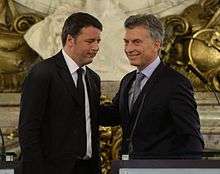
Italian Prime Minister Matteo Renzi called Macri on the night of his victory and stated that he would meet soon with the new president to "open a new page of collaboration between the two countries". He also highlighted the historical and cultural ties between the two countries, stating that "it is the country with the largest presence of Italian citizens in the world", numbering some 900,000. The Cambiemos victory also provoked much reaction in the domestic Italian press.[48] On 15 February 2016, Renzi met with Macri for a two-day state visit to Buenos Aires;[49] Renzi was the first European leader to meet Macri after the 2015 presidential election and the first Italian Prime Minister since Romano Prodi in 1998 to visit Argentina.[50]
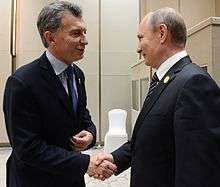
French President François Hollande sent a telegram to Macri and expressed "We will have the opportunity at that time to deepen our dialogue and our bilateral relationship that is one of the densest known to the Latin American continent". Hollande also confirmed a state visit to Argentina in February 2016.[51] Upon congratulating President Macri on his victory in the 2015 election, President Hollande announced that he would visit Argentina in February 2016. During his state visit to Buenos Aires on 24–25 February 2016, Macri and Hollande signed 20 bilateral agreements.[52]
British Prime Minister David Cameron called Macri after his election to congratulate him and offer his support for his presidency. A Downing Street spokesperson stated that "both leaders expect to meet in the near future", emphasising trade relations and investments, while also prioritising the establishment of a free trade agreement between MERCOSUR and the European Union "as soon as possible".[53] The chancellor Susana Malcorra clarified that Argentina would maintain the Argentine claim in the Falkland Islands sovereignty dispute, but would also try to expand the Argentina–United Kingdom relations into other areas of interest.[54] Macri met Cameron at the World Economic Forum in Davos, Switzerland, to which Argentina officially returned after 12 years. After the meeting, Macri said he had a "very nice meeting" with Cameron and explained in a brief meeting with journalists that their goal is to initiate "a relationship in which all issues on the table are placed under one umbrella". Chancellor Malcorra reported that the dispute over the sovereignty of the Falkland Islands was one of the most important axes of the meeting, but not the only one. "Focusing our relationship only in the Islands is to stay with the glass half full," said the minister.[55]
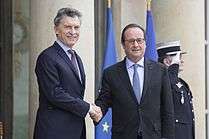
In July 2016, President Macri started a European tour that took him to France, Belgium and Germany, where he sought to project his international leadership as a political and commercial partner of the European Union.Macri held in Paris a meeting with French President Francois Hollande, and Berlin with German Chancellor Angela Merkel, in this case in the context of a two-day official visit in which the President was accompanied by businessmen. In addition to meeting with the two leaders brunt of the European Union, Macri was received in Brussels by the European Council President Donald Tusk, the High Representative of the European Union for Foreign Affairs, Federica Mogherini, and by King Philip and Queen Mathilde at the Royal Palace of Brussels.[56]
Asia
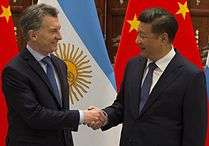
On March 27, 2016, a Casa Rosada official announced that President Macri will meet with Chinese president Xi Jinping on 1 April in the framework of the 2016 Nuclear Security Summit in Washington D.C.. China and Argentina established diplomatic relations in 1972 but revived especially during the mandates of Nestor Kirchner and Cristina Kirchner, during which relations reached the level of "Comprehensive Strategic Partnership". However, since the assumption of Macri, the relationship was observed for the promises of the now head of state during the election campaign to "review" the proceedings between the Casa Rosada and Beijing between 2003 and 2015. Both countries signed agreements in 2015 for the construction of two new nuclear power plants in Argentina, with a total investment of 15,000 million dollars in an operation in which China pledged 85 percent of funding. China is the second main destination of Argentine exports after Brazil.[57][58]
During the 2016 Nuclear Security Summit Macri also met with Japanese prime minister Shinzo Abe, Indian prime minister Narendra Modi and South Korean president Park Geun-hye with the aim to resume relations and try to add investors in Argentina. Japan and South Korea have a strong interest in investing in the areas of mining, energy, and infrastructure, and to raise levels of trade with Argentina. It is also known that there is a strong interest of Japanese and Korean companies to invest in the lithium deposits of the Argentine Northwest.[59]
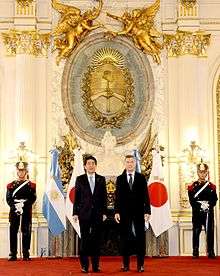
In September 2016, during the G20 summit in Hangzhou, China, President Macri met with Indian prime minister Narendra Modi and they made a commitment to expand the relations between Argentina and India. "I think so far the relationship between our countries has been a little superficial. It's a good opportunity to deepen" Macri said. Macri met Modi in one of the last added to its agenda of activities at the G20 summit bilateral meetings. Macri expressed interest to "increase and diversify" Argentine exports to India and for Indian companies to "come to invest in our country." Modi also expressed satisfaction that the Confederation of Indian Industry will participate in the Business Forum in the city of Buenos Aires. In addition, the Argentine president exchanged a greeting with Indonesian president Joko Widodo. In both meetings Macri was accompanied by Foreign Minister Susana Malcorra, Economy Minister Alfonso Prat-Gay, and Secretary of Strategic Affairs Fulvio Pompeo.[60][61][62]
In November 2016, President Macri received Japanese prime minister Shinzo Abe in the Casa Rosada of Buenos Aires to give a new impetus to the economic and commercial relations between both nations. Abe's state visit to Argentina was the first of a Japanese leader in 57 years. Macri and Abe signed several bilateral instruments, including a Memorandum of Cooperation for the establishment of an enhanced mechanism for political consultations. The last precedent was in 1959, when Nobusuke Kishi, Abe's grandfather, arrived to hold a bilateral meeting with the then President Arturo Frondizi.[63]
Middle East
On December 21, government lawyers withdrew an appeal in Federal Court made by Macri's predecessor, Cristina Fernández de Kirchner, over the constitutionality of a memorandum she had signed with the Iranian government, to investigate the 1994 AMIA bombing. The memorandum was criticized by both Israel and Argentina's Jewish community, as Iran was long suspected of being involved in the attack. The memorandum had been ruled unconstitutional by a federal court during Kirchner's administration, and along with the withdrawal of the appeal, the memorandum was voided by Macri's administration. The move was praised by Israeli Prime Minister Benjamin Netanyahu as an improvement of bilateral relations.[64]
In July 2016 President Macri met with the Emir of Qatar, Tamim bin Hamad Al Thani, at the Presidential Residence of Olivos. Both led the signing of memorandums of understanding signed Chancellor, Susana Malcorra, and his Qatari counterpart, Mohammed bin Abdulrahman bin Jassim Al-Thani. also they attended by the Chief of Staff, Marcos Peña, and the Minister of Finance and Public Finance, Alfonso Prat-Gay. In 2015, Argentina exported to Qatar goods by 11.5 million dollars and imported worth just over 153 million dollars, what, 141 million deficit in bilateral balance totaled 164 million, down 35 percent in relation to 2014, when the exchange was 471.5 million dollars, according to statistics from the Inter-American Development Bank (IDB).[65]
Cabinet
On the following days of the election, Macri and his team revealed the composition of the future cabinet. The cabinet is fully new, with the exception of Lino Barañao, who will continue as Minister of Science and Technology, having occupied the office since 2007 under Cristina Fernández de Kirchner administration. His cabinet it is composed by members of the Cambiemos alliance (Radical Civic Union, PRO, and Civic Coalition) and also some Independents and former and dissident members of the Justicialist Party.
Economic policy
One of the first changes to economic policy from the Macri administration, just seven days after Macri had taken office, was to remove the currency controls that had been in place for four consecutive years.[66][67] The move signified a 30% devaluation of the peso, and was met with both criticism and praise.[68][69][70]
In December 2015, Macri's administration removed taxes on exports of grain, beef and fish, while keeping a 30% export tax on soy, down 5% from a previous rate of 35%.[71][72] The administration also did away with previously imposed quotas on grain exports.[73]
On January 19, 2016, Macri attended the World Economic Forum in Davos, Switzerland with Sergio Massa and part of his cabinet looking for investments. He had meetings with various business representatives, politicians and journalists. Some of them were US Vice President Joe Biden, the Prime Minister of the United Kingdom, David Cameron, the founder of Virgin Group Richard Branson, CEO of Google Eric Schmidt, the Queen of the Netherlands, President and CEO Coca-Cola, Muhtar Kent among others.[74] It was the first time that Argentina participates in the Forum since 2003. The last president was Eduardo Duhalde.[75]
One of Macri's promises during the campaign was the elimination of Income tax for workers, saying "During my government workers will not pay tax on profits".[76] The Minister of the Economy and Public Finances, Alfonso Prat-Gay said that the draft amendments to the income tax will be sent to Congress for treatment on March 1, 2016.[77] As of december 2017, Macri has not fulfilled his promise, and it's not in the government's plan to eliminate the Income tax in the future either.[78]
Among the most notorious vulnerabilities of the current administration is an extremely high inflation rate, which, in the middle of the current economic crisis is still strangling the urban and rural, less-privileged population: although it was seen as coming down from the astounding 40% of 2016, it's expected to be of only 17% in 2018, from 27% in 2017 (while the government and the Central Bank said it was expecting a 17% inflation rate for the whole year of 2017).[79] Other vulnerabilities includes the unemployment rate close to 9% (and expected to be in two digits in the next two years), as well as the sharp rise in the current-account deficit, which is likely to be around 3% to 4% of GDP in 2017-2018 thanks to an over-valued currency.[79] Forecasts from the IMF show GDP growth backsliding a little in 2018, decelerating to 2.5% from 2.75% this year, and clearly any halting of the cyclical upswing in the global economy would set the country back.[79]
References
- ↑ Jonathan Watts and Uki Goñi (22 November 2015). "Argentina election: second round vote could spell end for 'Kirchnerism'". The Guardian. Retrieved 21 November 2015.
- ↑ "¿En qué consiste el "Plan Belgrano" de Mauricio Macri para desarrollar el norte del país?". www.lanacion.com.ar. Retrieved 2015-11-26.
- ↑ ""Plan Belgrano": el programa de inversiones para el Norte que anunciará Macri en el nuevo tramo de la campaña". Terra. Retrieved 2015-11-26.
- ↑ "En Tucumán, Mauricio Macri presentó sus propuestas para el desarrollo del norte del país | Mauricio Macri - Infobae". Retrieved 2015-11-26.
- ↑ "Marcos Peña anunció el Gabinete de Mauricio Macri: Prat Gay va a Hacienda y Patricia Bullrich a Seguridad". www.lanacion.com.ar. Retrieved 2016-01-27.
- ↑ Copesa, Grupo. "Mauricio Macri anuncia su gabinete para su gobierno en Argentina". www.latercera.com. Retrieved 2016-01-27.
- ↑ "Las 20 frases del discurso de Macri durante la asunción como presidente". Clarin. 10 December 2015.
- ↑ "Macri, desde el balcón de la Rosada: "Los argentinos merecíamos vivir mejor"". Clarin. 10 December 2015.
- ↑ "Tras asumir la presidencia, Macri se reúne con las delegaciones extranjeras en el Palacio San Martín". La Nacion. 10 December 2015.
- ↑ "Macri impulsará un giro en la política exterior". La Nacion. 24 November 2015. Retrieved 24 November 2015.
- ↑ "Mauricio Macri y Benjamin Netanyahu acordaron fortalecer los vínculos entre Argentina e Israel". Infobae. 21 January 2016. Retrieved 3 March 2016.
- ↑ "New Argentinian pres. says ties with Israel will improve, appoints rabbi to cabinet". The Jerusalem Post. 26 November 2015. Retrieved 3 March 2016.
- ↑ "ARGENTINA, BRASIL Y MÉXICO EN EL G20". panoramical. Retrieved 17 November 2015.
- ↑ Armendariz, Alberto (23 November 2015). "Dilma Rousseff felicitó a Macri y lo invitó a reunirse en Brasilia". La Nacion. Retrieved 23 November 2015.
- ↑ "Presidenta de Chile se comunico con Mauricio Macri". Telam. 22 November 2015. Retrieved 23 November 2015.
- ↑ "Juan Manuel Santos felicitó a Mauricio Macri". Infobae. 22 November 2015. Retrieved 24 November 2015.
- ↑ "Rafael Correa felicitó a Mauricio Macri por la victoria en el ballottage". La Nacion. 23 November 2015. Retrieved 23 November 2015.
- 1 2 "Macri anticipó su agenda internacional: Brasil y la Alianza del Pacífico". La Nacion. 23 November 2015. Retrieved 24 November 2015.
- ↑ "Humala a Macri: Avancemos en la agenda bilateral entre el Perú y Argentina". Americatv. 23 November 2015. Retrieved 23 November 2015.
- ↑ "Vázquez felicitó a Macri". Republica. 24 November 2015. Retrieved 24 November 2015.
- ↑ "Argentina: Trade Statistics". Michigan State GlobalEdge. Retrieved 22 May 2016.
- ↑ Stuenkel, Oliver (December 7, 2015). "Maduro's acceptance of election results is early foreign policy win for Macri". Post-Western World. Retrieved December 16, 2015.
- ↑ "Macri, en la cumbre del Mercosur: "Pido por la pronta liberación de los presos políticos en Venezuela"" [Macri, in the Mercosur summit: "I ask for the swift liberation of the political prisoners in Venezuela"] (in Spanish). La Nación. December 21, 2015. Retrieved December 17, 2015.
- ↑ "Venezuela opposition cheer Macri's Argentina presidential win". Reuters. November 23, 2013. Retrieved November 23, 2015.
- ↑ Reuters (November 26, 2015). "Diosdado Cabello, el hombre fuerte de Venezuela, llamó "fascista" a Macri y le advirtió: "No se meta con nosotros"" [Diosdado Cabello, the strongman of Venezuela, called Macri a "fascist" and warned: "Do not mess with us"] (in Spanish). La Nación. Retrieved November 23, 2015.
- ↑ Caistor, Nick (December 11, 2015). "Latin America: The pink tide turns". BBC. Retrieved June 12, 2016.
- ↑ "Dilma recibe a Macri en Brasilia". Diario Jornada. 5 December 2015. Retrieved 5 December 2015.
- ↑ "Bachelet recibió a Macri en Santiago de Chile". Infobae. 5 December 2015. Retrieved 5 December 2015.
- ↑ "John Kerry: "Espero trabajar en estrecha colaboración con Mauricio Macri"". La Nacion. 23 November 2015. Retrieved 24 November 2015.
- ↑ "Tras el triunfo de Macri, legisladores de EE.UU. le piden a Barack Obama que "priorice las relaciones con la Argentina"". La Nacion. 25 November 2015. Retrieved 26 November 2015.
- ↑ "Barack Obama felicitó a Mauricio Macri y se comprometió a trabajar en el sector energético". La Nacion. 25 November 2015. Retrieved 26 November 2015.
- ↑ "Argentina: Won't submit to 'extortion' on debt". www.sfgate.com. Associated Press. 16 June 2014.
- ↑ "Statement by the Press Secretary on the President's Travel to Cuba and Argentina". White House Office of the Press Secretary. February 18, 2016. Retrieved March 23, 2016.
- ↑ Gilbert, Jonathan (March 23, 2016). "President Obama's Argentina Visit Is All About Trade". Fortune. Retrieved March 23, 2016.
- ↑ Bronstein, Hugh; Lough, Richard (March 23, 2016). "Obama in Argentina to reset relations amid regional political shift". Reuters. Retrieved March 23, 2016.
- ↑ Lahrichi, Kamilia (March 23, 2016). "Under heavy security, Obama touches down in Argentina in historic state visit". USA Today. Retrieved March 23, 2016.
- ↑ "Remarks by President Obama and President Macri of Argentina in Joint Press Conference". White House Office of the Press Secretary. March 23, 2016. Retrieved March 24, 2016.
- ↑ "Obama: 'Macri moved rapidly to reconnect Argentina with the global economy'". Buenos Aires Herald. March 23, 2016. Retrieved March 24, 2016.
- ↑ Davis, Julie Hirschfield; Gilbert, Jonathan (March 23, 2016). "Obama Declares a New Partnership After Talks With Argentine Leader". The New York Times. Retrieved March 24, 2016.
- ↑ Lee, Carol E.; Turner, Taos (March 23, 2016). "Obama and Argentine President Mauricio Macri Reset Bilateral Ties". The Wall Street Journal. Retrieved March 24, 2016.
- ↑ "Malcorra confirmó que Argentina firmó un acuerdo con EE.UU. "para iniciar el proceso de eliminación de la visa"". La Nación. March 24, 2016. Retrieved March 24, 2016.
- ↑ "Malcorra ratificó avances para eliminar el visado para ingresar a los EE.UU". Perfil. March 24, 2016. Retrieved March 24, 2016.
- ↑ "Argentineans May No Longer Need a Visa to Enter the US". PanAm Post. March 15, 2016. Retrieved March 24, 2016.
- ↑ "Angela Merkel felicitó a Mauricio Macri y lo invitó a Alemania". La Nacion. 24 November 2015. Retrieved 24 November 2015.
- ↑ Rodríguez Yebra, Martín (23 November 2015). "Mariano Rajoy felicitó a Mauricio Macri y lo invitó a España". La Nacion. Retrieved 23 November 2015.
- ↑ "Putin le mandó un telegrama a Macri para saludarlo por el triunfo". La Nacion. 23 November 2015. Retrieved 23 November 2015.
- ↑ "Mauricio Macri recibió al presidente búlgaro, Rosen Plevneliev". La Nacion. 4 February 2015. Retrieved 4 February 2015.
- ↑ Piqué, Elisabetta (23 November 2015). "Matteo Renzi llamó a Macri para felicitarlo". La Nacion. Retrieved 23 November 2015.
- ↑ Renzi in Argentina
- ↑ Renzi: a young visitor from the old world
- ↑ "François Hollande felicitó a Macri por su triunfo y confirmó que vendrá al país en febrero". La Nacion. 29 November 2015. Retrieved 29 November 2015.
- ↑ "François Hollande felicitó a Macri por su triunfo y confirmó que vendrá al país en febrero". La Nacion (in Spanish). 29 November 2015. Retrieved 29 November 2015.
- ↑ "Cameron llamó a Macri para felicitarlo y ofrecerle apoyo". La Nacion. 26 November 2015. Retrieved 26 November 2015.
- ↑ "Malvinas is central for Argentina, but 'there are a lot of other areas to work with the UK'". Merco Press. December 16, 2015. Retrieved December 12, 2015.
- ↑ "Mauricio Macri se reunió con David Cameron en Davos". Infobae. 21 January 2016. Retrieved 21 January 2016.
- ↑ "Macri inicia su gira por Europa". La Voz. 2 July 2016. Retrieved 2 July 2016.
- ↑ "Macri se reunirá con Xi Jinping". Perfil. 27 March 2016. Retrieved 27 March 2016.
- ↑ "Mauricio Macri se reunirá con el presidente de China en Washington". La Nación. 27 March 2016. Retrieved 27 March 2016.
- ↑ "El Gobierno prepara reuniones con China, Japón y Corea del Sur". La Nación. 27 March 2016. Retrieved 27 March 2016.
- ↑ http://www.casarosada.gob.ar/informacion/actividad-oficial/9-noticias/37219-el-presidente-macri-se-reunio-con-el-primer-ministro-de-la-india-narenda-modi
- ↑ http://www.diariojornada.com.ar/noticias/noticia.aspx?id=168880&s=politica&t=Macri_se_reunio_con_Narendra_Modi
- ↑ https://noticias.terra.com.ar/mundo/asia/macri-se-ve-con-rajoy-putin-y-modi-en-intenso-dia-de-promocion-economica-g20,9f5551489e5fad120e9b8d56a3969decnhx6obdg.html
- ↑ Cadena 3 (21 November 2016). "Macri recibió en Casa Rosada al primer ministro de Japón". Cadena 3. Retrieved 21 November 2016.
- ↑ "New Argentina government voids pact with Iran on AMIA bombing". The Times of Israel. December 14, 2015. Retrieved December 22, 2015.
- ↑ Ambito (28 July 2016). "En busca de inversiones, Macri se reunió con el Emir de Qatar".
- ↑ "Argentina elimina desde hoy el "cepo cambiario"". www.elpais.com.uy (in Spanish). Retrieved 2015-12-29.
- ↑ País, Ediciones El (2015-12-17). "Argentina libera el control de capitales". EL PAÍS (in Spanish). Retrieved 2015-12-29.
- ↑ "Argentina lifts currency controls, floats peso in bid to boost economy". the Guardian. Retrieved 2015-12-29.
- ↑ "RT - Argentina anuncia fin del cepo cambiario".
- ↑ "El final del cepo: a partir de hoy se podrán comprar y vender dólares libremente". Clarin.com. Retrieved 2015-12-29.
- ↑ Mander, Benedict (2015-12-14). "Mauricio Macri scraps tax on Argentine farm exports". Financial Times. ISSN 0307-1766. Retrieved 2015-12-31.
- ↑ "Confirmado: Macri anunció retenciones cero, salvo para la soja". www.lanacion.com.ar. Retrieved 2015-12-31.
- ↑ "Argentina's Macri scraps corn and wheat export quotas". Reuters. 2015-12-29. Retrieved 2015-12-31.
- ↑ "La agenda de Mauricio Macri en Davos". La Nacion. 19 January 2016. Retrieved 2015-12-31.
- ↑ "Macri confirma viaje a Davos para primera participación argentina en 12 años". Terra. 18 January 2016. Retrieved 2015-12-31.
- ↑ "Macri Video". Mauricio Macri Official Site. October 2015. Retrieved 2015-12-31.
- ↑ "Macri dio marcha atrás con el aguinaldo". Pagina 12. 7 December 2015. Retrieved 2015-12-31.
- ↑ Macri: “Los trabajadores no van a pagar impuesto a las Ganancias”: INCUMPLIDA (Macri - fulfilled and unfulfilled promises) 12-10-2017 Chequeado.com (in Spanish)
- 1 2 3 Macri’s election success is no cure-all for Argentina’s structural issues November 17, 2017, Euromoney